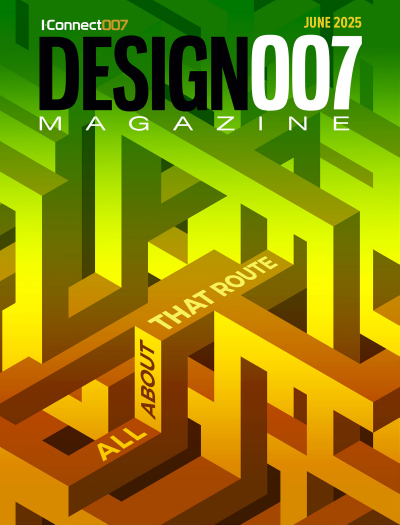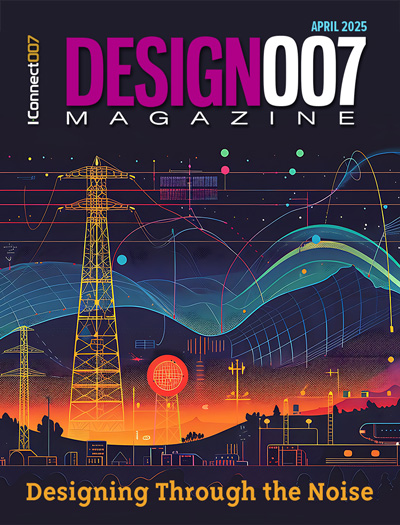-

-
News
News Highlights
- Books
Featured Books
- design007 Magazine
Latest Issues
Current Issue
All About That Route
Most designers favor manual routing, but today's interactive autorouters may be changing designers' minds by allowing users more direct control. In this issue, our expert contributors discuss a variety of manual and autorouting strategies.

Creating the Ideal Data Package
Why is it so difficult to create the ideal data package? Many of these simple errors can be alleviated by paying attention to detail—and knowing what issues to look out for. So, this month, our experts weigh in on the best practices for creating the ideal design data package for your design.

Designing Through the Noise
Our experts discuss the constantly evolving world of RF design, including the many tradeoffs, material considerations, and design tips and techniques that designers and design engineers need to know to succeed in this high-frequency realm.
- Articles
- Columns
Search Console
- Links
- Media kit
||| MENU - design007 Magazine
New Cryostatic Systems Elevate Current Research on Qubits
March 31, 2025 | Fraunhofer IAFEstimated reading time: 2 minutes
The Center Nanoelectronic Technologies (CNT) at Fraunhofer IPMS has recently acquired new cryostats for the research on qubits and the qualification of superconducting systems. The cryogenic measuring devices, which are particularly useful for analyzing quantum systems, are now in full operation. The provision of the equipment was funded by the Saxon State Ministry for Science, Culture and Tourism (SMWK).
Whether in medicine, material science or traffic planning - quantum computing is set to play a key role in future research. Qubits, the memory components for the development of complex quantum mechanical systems, are fragile and error-prone despite their versatility. Superconducting chips or circuits stabilize these fragile qubit states, but to do so they must be cooled down to the millikelvin range.
In order to ultimately realize a complex system, such as a quantum computer, all other technical components, like circuits, memory chips or components for thermal insulation, must also function at these temperatures. The new cryostats at CNT make it possible to test a wide variety of structures, materials and circuits under these extremely cold conditions.
Cooler, more efficient and expandable - new systems offer optimal test conditions
The cryostat “SD dilution refrigerator system” (SD cryostat) from the Finnish developer Bluefors offers advantages to the current inventory at Fraunhofer IPMS due to its versatility and options for expansion. With this, cables can be fitted subsequently and according to the respective requirements, but it is also possible to install additional components for signal generation and processing at warmer cooling levels. The SD-cryostat will be primarily used for cryogenic CMOS- and memory-component-development in order to create stable digital circuits and systems that function under extreme conditions. These components are aims of the current research projects “ARCTIC” and “QSolid” at Fraunhofer IPMS. Furthermore, systems with unequal temperature ranges for different sub-components will be evaluated, such as interposers in the project “QSolid”.
For tests with the “L-Type Rapid” cryostat from the Munich-based company Kiutra, samples are loaded into the sample chamber, which is a small elevator. Accordingly, only the samples themselves need cooling, rather than the entire system. This shortens the cooling and warm-up time of the sample chamber, which increases the number of samples to be analyzed. The system can also generate a strong magnetic field, as found in some quantum computers. It does not require the usual liquid helium mixture for cooling and achieves extremely low temperatures in the millikelvin range solely by using helium-4 and the rundown of several magnets to achieve even lower temperatures. The L-Type Rapid will be used primarily for the characterization of thin films and superconducting resonators for the readout of qubits. These alternative procedures reduce costs and test processes can be carried out more effectively and quickly.
Previously, samples could be cooled down to 1.7 K at CNT. The new cryostat systems now extend the measuring range down to 30mK, which is the working temperature for qubit and control chips of established quantum computer concepts. With the commissioning of these new cryogenic measuring devices, process development of the necessary components such as superconductors or cryo-electronics will be accelerated immensely. Research and analysis, inextricably linked to the development of quantum processors to ensure their low error rates and high performance, will be enhanced using the new facilities. They further expand the measurement capacities that CNT can offer its partners in funded projects or as a direct service. The goal of a sovereign quantum computer with Saxon roots is coming even closer, thanks to the funding and the ambition of the researchers.
Suggested Items
Hon Hai Research Institute Achieves Breakthrough in Quantum Cryptography Recognized by Leading Global Conference
06/17/2025 | FoxconnHon Hai Research Institute (HHRI), the research arm of Hon Hai Technology Group (Foxconn), the world’s largest electronics manufacturer and technology service provider, has achieved a significant breakthrough in quantum computing.
Leidos Using Quantum Technology to Thwart GPS Jamming
06/05/2025 | PRNewswireSusceptibility to jamming is a significant military vulnerability of the Global Positioning System (GPS) signal. Through a Defense Innovation Unit contract, Leidos is developing an alternative navigation technology that measures variations in the Earth's magnetic field and harnesses the quantum properties of nitrogen in diamonds.
IonQ Signs MoU with KISTI to Accelerate South Korea’s Role in the Global Quantum Race
06/02/2025 | IonQIonQ, a leading commercial quantum computing and networking company, today announced the signing of a memorandum of understanding (MoU) with the Korea Institute of Science and Technology Information (KISTI), a leading national science and technology research institute and supercomputing center.
Quantinuum, Al Rabban Capital Launch Joint Venture to Accelerate Quantum Computing Adoption in Qatar and the Region
05/21/2025 | QuantinuumQuantinuum, the world leader in quantum computing, is establishing a Qatari-incorporated Joint Venture with Al Rabban Capital, a division of Al Rabban Holding Company, one of Qatar’s most prominent companies.
Keysight Quantum Control System Embedded within Fujitsu and RIKEN’s World-Leading 256-Qubit Quantum Computer
05/16/2025 | BUSINESS WIREKeysight Technologies, Inc. announced that its Quantum Control System (QCS) has been selected as the control system embedded within Fujitsu and RIKEN’s recently developed 256-qubit quantum computer at the RIKEN RQC-FUJITSU Collaboration Center in Japan, marking a pioneering step in the industry’s pursuit of fault tolerant quantum computer.


